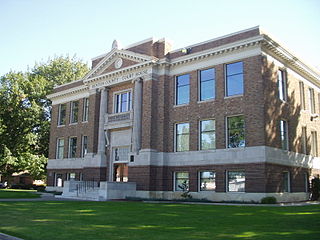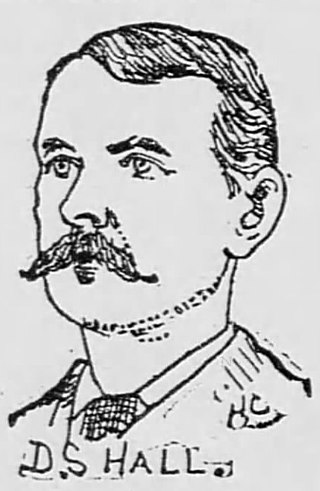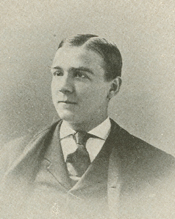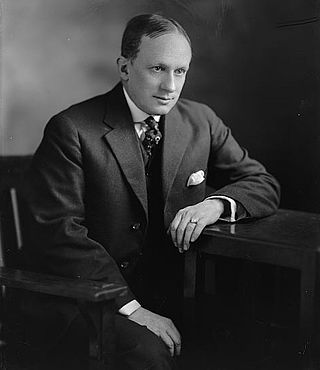Related Research Articles

Yakima County is a county in the U.S. state of Washington. As of the 2020 census,its population was 256,728. The county seat and largest city is Yakima. The county was formed out of Ferguson County in January 1865 and is named for the Yakama tribe of Native Americans.

Prosser is a city in and the county seat of Benton County,Washington,United States. Situated along the Yakima River,it had a population of 6,062 at the 2020 census.

Wesley Livsey Jones was an American politician who served in the United States House of Representatives and the United States Senate representing the state of Washington.

William Noble Andrews was a Congressman for the 1st congressional district of Maryland who served one term from 1919 to 1921.

Jacob Harold Gallinger,was a United States senator from New Hampshire who served as President pro tempore of the Senate in 1912 and 1913.

Miles Poindexter was an American lawyer and politician. As a Republican and briefly a Progressive,he served one term as a United States representative from 1909 to 1911,and two terms as a United States senator from 1911 to 1923,representing the state of Washington. Poindexter also served as United States Ambassador to Peru during the presidential administrations of Warren Harding and Calvin Coolidge.

Darwin Scott Hall was an American Republican politician who served one term in the United States House of Representatives,representing Minnesota's 3rd congressional district. He also served in the Minnesota Legislature.

Albert Joseph Engel was a politician from the U.S. state of Michigan.

Wells Goodykoontz was a Republican politician from the U.S. state of West Virginia who served in the West Virginia Legislature representing Mingo County. He was President of the West Virginia Senate from 1917 to 1919,and a Member of the U.S. House of Representatives from the now-defunct 5th congressional district of West Virginia. He served during the 66th and 67th United States Congresses.

George Newell Southwick was an American journalist and politician from Albany,New York. A Republican,he was most notable for his service as a U.S. Representative from 1895 to 1911.

Warren Isbell Lee was a U.S. Representative from New York.

William Henry Hill was an American politician from New York.

Homer Hoch was a United States Representative from Kansas.

Edward N. Whitson was a United States district judge of the United States District Court for the Eastern District of Washington.

Washington's 20th legislative district is one of forty-nine districts in Washington state for representation in the state legislature.

Elizabeth Piper Ensley,was an educator and an African-American suffragist. Born in Massachusetts,Ensley was a teacher on the eastern coast of the country. She moved to Colorado where she achieved prominence as a leader in the Colorado suffrage movement. She was also a journalist,activist,and a leader and founder of local women's clubs.
Lindberg is an extinct town in Lewis County,in the U.S. state of Washington. The GNIS lists location as unknown,however period maps show Lindberg on State Route 7,about three miles north of the U.S. Route 12 junction,where the East Fork Tilton River joins Tilton River.

Events from the year 1920 in Michigan.

The 1920 United States presidential election in North Carolina took place on November 2,1920,as part of the 1920 United States presidential election,which was held throughout all contemporary forty-eight states. Voters chose twelve representatives,or electors to the Electoral College,who voted for president and vice president.
References
- 1 2 "State of Washington: Members of the Legislature 1889-2019" (PDF). Washington Legislative Information Center. Brad Hendrickson, Secretary of the Senate; Bernard C. Dean, Chief Clerk House of Representatives. February 2019. Retrieved April 14, 2022.
- 1 2 3 4 "Ina Phillips Williams" (PDF). Women in the Legislature. Washington State Legislature . Retrieved April 13, 2022.
- 1 2 "Pierce County Auditor, Marriage Records, 1876-1947; 1984-Present - Wallis B Williams - Ina May Phillips". Pierce County Auditor, Marriage Records, 1876-1947; 1984-Present, Series: Marriage Records, ID: prcmc-vol-2_325-DA3. Washington State Digital Archives.
- ↑ "1910, U.S. Federal Census, Yakima County, U.S. Census Bureau - Ina P Williams". 1910, U.S. Federal Census, Yakima County, U.S. Census Bureau, Series: Census Records, ID: HRP1910YAK17794. Washington State Digital Archives.
- ↑ Haines, Lynn, ed. (February 1921). The Searchlight. Vol. V, no. 9. Searchlight Publishing Company. p. 24. Retrieved April 13, 2022.
- ↑ "Brown Is Promised Excellent Support - Kittitas County Candidate Returns to City". The Evening Record . August 23, 1920. p. 1. Retrieved April 13, 2022.
- ↑ Retka, Janelle (May 7, 2019). "Yakima Women's Century Club's long-serving members share history as they are honored". Yakima Herald-Republic . Retrieved April 13, 2022.
- ↑ "1920, U.S. Federal Census, Yakima County, U.S. Census Bureau - Yak_1920_000322.Tif - Ina P Williams". 1920, U.S. Federal Census, Yakima County, U.S. Census Bureau, Series: Census Records, ID: hrp_1920_Yak_15062. Washington State Digital Archives.
- 1 2 "Department of Health, Death Certificates, July 1, 1907-1996 - Ina P. - Phillips Williams - Clayton Phillips - Et Al.". Department of Health, Death Certificates, July 1, 1907-1996, Series: Death Records, ID: {5D6D3415-1424-496A-BF58-4F2A33AC3D88}. Washington State Digital Archives.
- ↑ "Tahoma Cemetery - Tahoma - P - Ina Williams". Tahoma Cemetery 186ONLINE 2009, Series: Cemetery Records, ID: HRPCEMYAKTAH031662. Washington State Digital Archives.